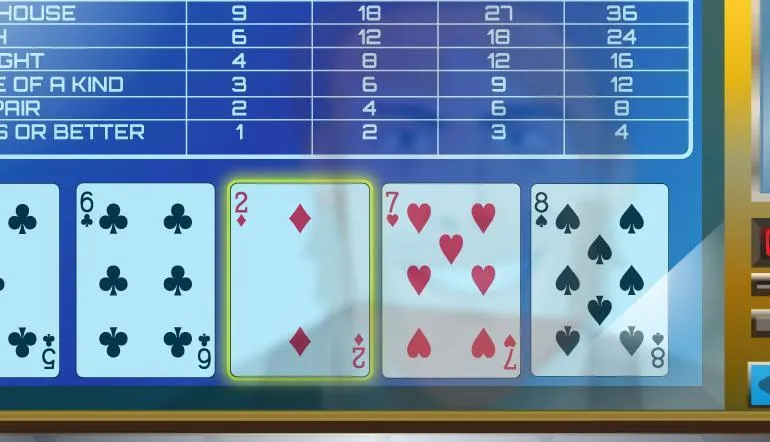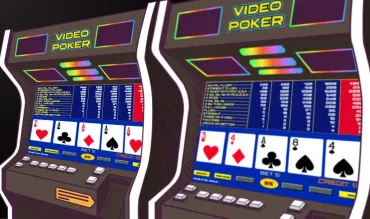Introduction
Most video poker players simply sit down at a machine and play. They do not keep track of which machine is played, amount deposited, amount cashed out, nor anything else.
This may be okay for casual players – those who only play a few hundred to a few thousand hands per year – but are more serious players missing something by not keeping records of their video poker play?
This article offers suggestions on what details to keep and why it is a good idea for serious players to document them.
Reasons to document video poker play
Documenting video poker play can be tedious at times. But, is being tedious a good reason to avoid keeping records?
I keep some quite detailed records of my video poker play. I do it for several reasons, which include:
- To keep an accurate record of my bankroll.
- To keep an accurate record of certain winning hands and the frequency of those hands.
- To keep track of how various video poker machines treated me – wins, losses, royal flushes, and so forth.
- To keep track of all player’s club points earned. If used for cash, food, lodging, et cetera, to show the impact on the win/loss rate.
- Some records are necessary as supporting documentation for filing income taxes.
It does take some work, and it involves stopping periodically to make notations. Overall, however, the relatively short time involved has proven well worth it.
Tracking bankroll fluctuations
This is arguably the most important reason to keep records.
Human memory is amazing. When it comes to gambling, we tend to remember things we want to remember and forget those we do not. Any serious video poker player needs to have accurate win/loss information. A foggy recollection simply will not do.
Some players keep track of their win/loss by recording how much they and how much they bring home. This may give a 30,000-foot view of things, but it is not accurate. Cash can be used for play, but it also can be used for food, tips, or miscellaneous purchases. Details specifically related to play are required for a good understanding of win/loss.

Tracking impact of player’s club and casino perks
Whether a player wants to count a player's club and other casino perks as part of the win/loss or not, keeping track of that information allows the player to see the impact – whether counted as part of as win/loss or not.
Tracking machine performance
I started tracking certain data from each machine based on one pundit’s claim that machines can be rigged. While I do not believe that to be the case in major gambling jurisdictions, this pundit also claimed that because the random number generator is really a pseudo-random generator, the results of the game might be biased.
I did not find bias in any game, but this data became useful for a different purpose (see next topic).
Detecting possible strategy errors
Keeping track of the number of hands played, the game type, and pay table allows players to calculate the return from each machine. Over time, if playing proper video poker strategy, the actual return should become closer to the mathematical return.
If this is not happening, it is possible the proper strategy is not being followed. Once detected, corrective action can be taken. Without this information, the player could continue merrily along without realizing the casino is getting more money that it should.
Records for tax purposes
When using itemized deductions for federal income tax filings (along with those for several states), the taxpayer is required to keep supporting documentation for any wins or losses claimed. The information required usually includes casino, machine number, date, start time, end time, and amount won or lost.
Probably very few tax returns are audited because of gambling wins or losses claimed, but why invite trouble?
Details to record and how to gather and log them
The information I capture:
- Location
- Casino
- Date
- Start time
- End time
- Game and pay table abbreviation, e.g., 9/6 JoB
- Denomination of the game
- Machine number
- Amount of each bill inserted into the machine
- Amount cashed out
- Player’s club points at start
- Player’s club points at end
- Any auxiliary wins from scratch offs, or special promotions
- Royal flush information (meter reading or time, specific cards)
- Straight flush information (meter reading or time, specific cards)
- Four-of-a-kind information (meter reading or time, card rank)
- Hash totals for full houses, four of a royal, four of a straight flush, four of a flush, and flushes completed when dealt four.
It is a lengthy list to be sure. I bring a small notebook and a pen with me and write the machine number, game, denomination, starting meter reading, date and start time as well as label areas for the items getting hash marks. I log the amount of each bill fed into the machine. At the end of a session, I log the end time, ending meter reading, and amount cashed out. I also jot down any comments I might have.
It takes a bit of time at the beginning and end of each session, and a bit of time with each royal, straight flush, and four of a kind. The hash totals go very quickly.
To calculate the number of hands played the player also needs to know the cost per point. This is not readily available in some casinos. If not, note the point meter, then play 20 to 50 hands and note the point meter again. From this the cost per point can be calculated. From the cost per point, the number of hands played can be calculated from the number of points earned.
At the end of the day this information is fed into a spreadsheet. The spreadsheet calculates:
- Session time
- Hands played
- Hands per hour
- Number of, frequency, and hands between each:
- Royal flush
- Straight flush
- Four-of-a-kind
- Full house
- Completion of 4 of a flush
Please contact me at the email listed at the end for more information.
Summary
Documenting video poker play may be tedious, but it can provide valuable information.
Documentation is required to support filing of itemized tax returns.
For a complete guide on how to win at video poker, click here.


